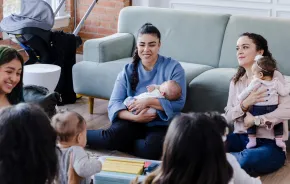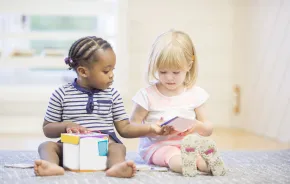 Erin Whitson remembers the tween rebellion struggle well. The Bainbridge Island real estate broker’s daughter Tiana is now an athletic, successful 21-year-old college student. But Whitson recalls navigating the stormy waters of her daughter’s “tween years” — those turbulent ages between 11 and 14. She says that she found the greatest challenge of her tween's rebellion to come from peer pressure.
Erin Whitson remembers the tween rebellion struggle well. The Bainbridge Island real estate broker’s daughter Tiana is now an athletic, successful 21-year-old college student. But Whitson recalls navigating the stormy waters of her daughter’s “tween years” — those turbulent ages between 11 and 14. She says that she found the greatest challenge of her tween's rebellion to come from peer pressure.
“It really helps if your tween already has a strong strength of character instilled in them,” Whitson says. From the time Tiana was a young girl, Whitson and her husband, Richard, made sure that it was ingrained in her that she made choices, and the consequences of her behavior were based on those choices.
The Whitson's also emphasized actively listening to their tween daughter, and that they made an effort to eat dinner together as a family as often as possible. They kept their tween busy with activities of her choosing that built character and self-esteem, including basketball and Girl Scouts. Tiana eventually earned her Gold Award, the Girl Scouts’ highest honor.
Your growing tween
Jenny Frank-Doggett of Tiger Mountain Counseling is an Issaquah counselor in private practice. She says tweens experience several important biological changes between the ages of around 9 and 15 that make for “interesting” behavior. The process tends to occur slightly earlier in tween girls than boys. “For younger tweens, these characteristics include reaching reproductive maturity, a growing sense of independence and self sufficiency, developing same-sex friendships and learning new social skills, and developing more concrete logic skills,” Frank-Doggett says. This can result in behaviors such as the beginning of sexual experimentation, starting to stray from the family and having a deeper interest in friends, sometimes to the exclusion of family. At this age, Frank-Doggett says, tweens may use jokes that seem cruel to vent aggression.
The importance of respect
Frank-Doggett says there are important ways parents can support their tweens during this challenging time. “They need to feel respected and to see role models who respect others and themselves. Problem solving does not work in an atmosphere of disrespect. Tweens also need parents to help them balance limits with new freedoms,” Frank-Doggett says.
“Tweens need to feel like they belong, both within their families and outside of the home. Having friends or belonging to a group can feel like the most important thing in a tween’s life, often to the exclusion of everything else.”
Watch for red flags
Kris Coppedge is a counselor with a private practice in Lynnwood. One third of her patients are tweens. She says that while many tweens navigate the journey to adulthood successfully, there are some who do not, and they display “red flags” that parents should watch for. Look out for a depressed mood that lasts for two weeks or more, especially if accompanied by a decline in self-care, a change in appetite, sleeping habits or school performance. Other red flags can include anxiety that causes a child to decrease involvement in activities or talk of suicide. And parents should watch for hyperactivity that interferes with sitting still, concentrating or sleeping and particularly with tween boys, an obsession with knives, fire or any sort of weapon.
Coppedge says other tween rebellion red flags can include, “a sudden change in peer group, friends who are getting into legal trouble, failing in school, running away, or who exhibit other serious problems. Even if your tween has similar troubles, kids who begin to identify with others with the same problems are more likely to find reinforcement for their negative behaviors.” Also of concern is a child who says they have no friends.
If you see any of these behaviors in your rebelling tween, Coppedge says you should seek professional help for your tween.
 Remember your goal
Remember your goal
Even without “red flag” issues, most parents find navigating the tween and teen rebellion years challenging, and Frank-Doggett says it helps to keep in mind the end goal: a capable, confident and independent adult. “Many of the challenges or difficult behaviors experienced when our children are tweens and teens are the product of their natural, biological and psychological development toward this end,” she says.
“Challenges that seem frustrating for parents of tweens today may actually be helping the tween to grow up,” says Frank-Doggett. “In other words, challenge is opportunity for growth.”
Kathleen F. Miller is a Sammamish-based freelance writer and mother of two.
Websites:
Parenting Teens: Information on specific issues, including normal teen concerns and specific disorders.
All Pro Dad: A site just for dads.
SAMSHSA Family Guide: Excellent family guide with many links. SAMHSA stands for Substance Abuse and Mental Health Services Administration.
Books:
Active Parenting of Teens: Parents Guide, by Michael H. Popkin
Parenting Teenagers, by Don Dinkmeyer and Joyce McKay
Getting to Calm: Cool-Headed Strategies for Parenting Tweens and Teens, by Laura Kastner and Jenny Wyatt
How to Talk So Teens Will Listen and Listen So Teens Will Talk, by Adele Faber and Elaine Mazlish
Staying Connected to Your Teenager: How to Keep Them Talking to You and How to Hear What They’re Really Saying, by Michael Riera
Parents, Teens and Boundaries: How to Draw the Line, by Jane Bluestein
Get Out of My Life, But First Could You Drive Me and Cheryl to the Mall: A Parent’s Guide to the New Teenager, by Anthony E. Wolf
For parents of tween girls:
Reviving Ophelia: Saving the Selves of Adolescent Girls, by Mary Pipher and Ruth Ross
Queen Bees and Wannabees, by Rosalind Wiseman
For parents of tween boys:
Raising Cain: Protecting the Emotional Life of Boys, by Dan Kindlon and Michael Thompson
Strong Mothers, Strong Sons: Raising the Next Generation of Men, by Ann F. Caron
Local Agencies:
King County Youth and Family Services Program
Outreach, youth and family counseling, case management, gang intervention, drug prevention, parenting classes and more.
Friends of Youth
Services for teens and their families, from counseling and parent education to youth activity programs.
Youth Eastside Services (YES)
Comprehensive youth and family services.











